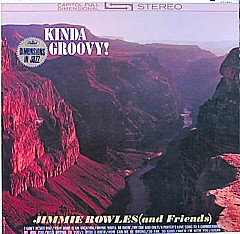Home · Listener's Guide · The Songs · Who's Who · Liner Notes · Selected Tracks · What's New · Search

Home · Listener's Guide · The Songs · Who's Who · Liner Notes · Selected Tracks · What's New · Search
|
|
Listen to "A Porter's Love Song to a Chambermaid"
from |

|
|
|
|
Jimmie Rowles, Piano and Voice Howard Roberts, Guitar Max Bennett, Bass Nick Martinis, Drums Shelly Manne, Drums on 3 cuts |
Recorded in Capitol Records' Studio A Hollywood, California October 23, 24, and 26, 1962 Dave Cavanaugh, Producer |
|
This album is a little gem. Jimmie Rowles was one of the better-known little-known jazz musicians throughout his career, a very able pianist with a light and swinging touch. Rowles rarely recorded under his own name until late in his career because he spent nearly thirty years as a hard-working Hollywood session musician. Even then, he wouldn't have been known as a singer outside a tiny circle of fellow musicians had he not landed a short gig accompanying Peggy Lee at appearance in Las Vegas, taking the place of her usual pianist, Lou Levy.
According to the liner notes on the album, Lee heard Rowles sing a bit while they were rehearsing for the show, and she recommended Capitol exec Dave Cavanaugh check him out. So, some time later, as Rowles, Shelly Manne, and a couple other musicians were about to pack up after backing another singer on a Capitol session, Cavanaugh stepped in and asked them to stay.
So Cavanaugh tested Rowles, liked what he heard, and signed him for this album. Capitol probably didn't make anything on it. It's laid-back, casual, features a no-name singer with almost no voice (in the eyes and ears of Joe Public), and has no current hits. Rowles probably didn't even give it a second thought. He was smart enough not to quit his day job.
It's a shame, in a way, because this is a terrific album. OK, he's no Pagliacci, but he's not trying to be. Rowles' reputation for musical judgment was equal to Lee's among his peers, and he had an apparently endless stock of tunes he could call up at will. Not just all the standards, but obscure little numbers like this one. Written by stride pianist James P. Johnson and Andy Razaf (Eubie Blake's usual lyricist) and recorded by Fats Waller, Mildred Bailey, and a few others, it's just a string of matched analogies:
I suspect Rowles' voice couldn't have stood up to the 2-3 shows a night routine that Allison had to work for years running to keep his career going and that he wasn't too bummed out not to be heading off for a life on the road after this album. But at least we have this to enjoy, and can settle for imagining what it'd be like to have others to choose from. Bennett and Martinis were part of Rowles' regular combo when he played a regular Sunday night gig at the Carriage House in Burbank, and Roberts, a true studio guitar wizard, gets a rare chance to play the music he loved best, straight-ahead jazz.
This record contains the following "Orthographical Note," by the way:
S p a c e A g e P o p M u s i c
|